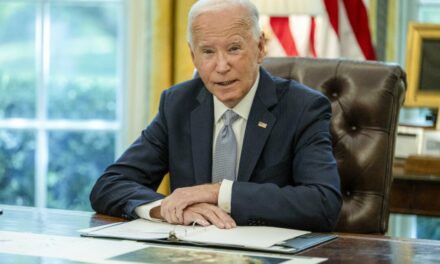We support our Publishers and Content Creators. You can view this story on their website by CLICKING HERE.
Democrats want to retain their supermajority, while Republicans are looking to flip some seats from blue to red.
California’s Legislature will have a host of new faces after the Nov. 5 election, as 19 assemblymembers and 11 senators will not be returning to the Capitol, and several tight races could result in seats flipping from Democrat to Republican.
Term limits—established by voters in 2012 by Proposition 28, which limits lawmakers to serving 12 years in the Legislature—affect eight members of the Assembly and nine senators.
Assemblyman Jim Wood, who has served as Assembly Speaker pro-Tempore since November 2023, is retiring.
Some assemblymembers—including Evan Low, Luz Rivas, and Laura Friedman—have resigned to run for Congress.
Assemblyman Kevin McCarty is running for Mayor of Sacramento.
Former Assemblyman and current Rep. Vince Fong (R-Calif.) left his seat in June to fill the vacancy created when former Rep. Kevin McCarthy resigned from Congress.
Four members unsuccessfully attempted to run for local government positions in Los Angeles.
Four Democratic assemblymembers—Carlos Villapudua, Tim Grayson, Eloise Reyes, and Sabrina Cervantes—retired from their positions to run for state Senate seats.
Villapudua vacated his seat in the state’s 13th Assembly district—representing part of San Joaquin County—to give his wife, Edith Villapudua, a chance to run for Assembly while he sought a Senate position, but both failed to advance past the primary.
Voters in the district will choose between Democratic candidate Rhodesia Ransom, former Tracy city councilor, and Republican nonprofit director Denise Aguilar Mendez to replace Villapudua in the Assembly.
California is split into 80 Assembly districts and 40 Senate districts, and the Legislature currently consists of a Democratic supermajority.
Democrats control the Assembly 62 to 17—with Fong’s seat vacant—and 31 to 9 in the Senate. The Republican total in the Senate increased in August after Sen. Marie Alvarado-Gil switched parties.
Assemblymembers serve two-year terms, while senators serve four-year terms, with 20 seats coming up for election every two years.
Close races this year include the state’s 27th Assembly district, which encompasses parts of Fresno, Madera, and Merced counties.
Incumbent Assemblywoman Esmeralda Soria, a Democrat, is seeking reelection and received 49.1 percent of the votes in the primary, while her challenger, Republican Joanna Garcia Rose—with a background as a tax auditor for the California Employment Development Department—won the March election with 50.9 percent.
Soria says she is focused on securing funding for the Central Valley, police, and other emergency responders, while opposing tax hikes that impact middle-class families.
California’s 40th Assembly district—representing northern parts of Los Angeles County, including the City of Santa Clarita—is a race between incumbent Democratic Assemblywoman Pilar Schiavo, who garnered 50.2 percent of the primary vote, and Republican Patrick Lee Gipson, a retired deputy sheriff, who got 49.8 percent.
The incumbent highlighted her career experience while asking voters to support her, saying her work authoring bills to address housing affordability, homelessness, and access to health care, demonstrates her commitment to the community.
Her challenger Gipson says his decades-long background in law enforcement with the Los Angeles County Sheriff’s Department demonstrates his desire to serve his community.
In the state’s 58th Assembly district, representing parts of Riverside and San Bernardino counties, Clarissa Cervantes, sister of incumbent Democratic Assemblywoman Sabrina Cervantes—who retired to run for state Senate—is running against Republican psychotherapist Leticia Castillo.
Castillo won 48.6 percent of the primary vote to Cervantes’s 25.9 percent, but another Democratic candidate, Ronald Fierro, split the blue vote, receiving 25.5 percent of the votes.
Incumbent Democratic Assemblyman Corey Jackson is looking to retain his seat in the Assembly’s 60th district—encompassing part of Riverside County.
Jackson won 51.8 percent of the March primary vote and will face Republican business owner Ron Edwards—who garnered 27.1 percent, while fellow Republican candidate Hector Diaz Nava received 21.1 percent.
Another close Assembly race is evolving in the 76th district—representing part of San Diego County—after Democratic Assemblyman Brian Maienschein was term-limited and decided to run for San Diego City Attorney.
Republican Kristie Bruce-Lane, a former Olivenhain Municipal Water District board director, is facing off against Democrat Darshana Patel, president of the Poway Unified School Board.
Bruce-Lane won 49.5 percent of the primary vote, while multiple Democratic candidates split the blue vote, with Patel earning 34.2 percent and attorney Joseph Rocha receiving 16.4 percent.
The Republican candidate said she intends to reduce the cost of living, cut taxes, address the fentanyl crisis, and improve public safety.
Patel cites her diverse background and experience in education as factors that helped prepare her for a role in the Assembly.
“As the daughter of immigrants who struggled to realize the American Dream, I know the challenges that families can face during hard times,” she says on her campaign website. “I am running for State Assembly because I want to make sure that every person has the opportunity to succeed and thrive and because I can use my experience as a scientist, elected school board member, community leader, and mom to make a difference in their lives.”
In the Senate, seven Democrats—Bill Dodd, Susan Talamantes Eggman, Anthony Portantino, Nancy Skinner, Richard Roth, Steven Bradford, and Toni Atkins—and two Republicans—Brian Dahle and Scott Wilk—are being forced out by term limits.
Based on primary results, the seats are expected to remain in the same party’s control.
The 37th Senate district—encompassing central Orange County—is a relatively close race. The primary results were split between 11 candidates after incumbent Dave Min retired to run for Congress.
Democratic Sen. Josh Newman—who previously represented the 29th district in Orange County before boundaries were changed in 2021 in redistricting efforts—is the front-runner after winning 30.1 percent of the primary vote.
Republican Steven Choi, a former assemblyman and former mayor of Irvine, earned 21.7 percent of the vote and will face off against Newman.
With the Legislature in recess and less than two months to go before the election, candidates are working in their districts to secure the votes needed to win in November.

 Conservative
Conservative  Search
Search Trending
Trending Current News
Current News 







